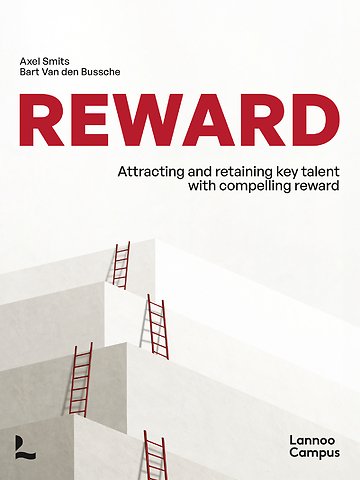


Axel Smits heeft de afgelopen 8 jaar PwC België geleid en is sinds 1 januari van dit jaar Managing Partner van PwC Europe. Tijdens zijn rijk gevulde carrière zag hij tal van landen die vaak met minder troeven beter scoorden dan België. Hij vindt het hoog tijd dat we allemaal samen de handen uit de mouwen steken om van België een beter land te maken.
Meer over de auteursReward
Attracting and retaining key talent with compelling reward
Paperback Engels 2024 1e druk 9789401438667Samenvatting
'In today's competitive and inflationary environment, many organisations are focused on containing costs, yet they also realise that they need to do their utmost to attract and retain the best talent. This makes it increasingly important to optimise the return on their investment in reward.'
In a present and future where talent is a scarce resource, what can organisations do to stand out from the crowd as an employer of choice? Traditionally, this means offering higher salaries and larger benefit packages. This has two major disadvantages: it is not enough to compel employees to stay and it erodes profitability, making it unsustainable in the long run. This realisation is forcing organisations to take a long, hard look at their reward practices and find new ways to tackle the issue.
This book looks at how emerging trends like GenAI, increased transparency and the increasing cost of living impact reward. Instead of focusing purely on financial benefits, the five-pillar approach outlined in these pages takes organisations on an investigation of every aspect of their current reward system: from evaluating the value of jobs within the organisation and benchmarking salaries across their industry or region to carrying out employee preference studies that ask employees which financial and non-financial benefits they value.
The resulting reward systems speak for themselves: cost-efficient, customisable, flexible and compelling reward that attracts and retains key talent. How can your organisation benefit?
Trefwoorden
Specificaties
Lezersrecensies
Inhoudsopgave
A word from the editors 11
Editors 14
Contributors 15
How to use this book 19
Understanding reward
1. Reward and motivation 22
1. What is motivation? 24
2. Foundational motivation theories 26
3. Modern motivation theories 32
4. A generational perspective to reward 36
2. Functions of reward systems 38
1. The dynamics of talent demand and supply 40
2. Learn and develop 44
3. Social cohesion 45
4. Avoiding potential pitfalls 46
5. Well-structured reward systems 49
3. The impact of today’s world on reward 50
1. PwC megatrends 52
2. Aligning reward systems with business strategy 63
3. Flexible reward strategies 63
4. Transforming our world 65
Attractive and compelling reward packages
4. Creating a reward system 68
1. Reward scope 71
2. Reward architecture 72
3. Reward mix 72
4. Reward in transactions 73
5. Reward in different types of organisations 73
5. Reward scope 74
1. The foundations of reward scope 76
2. Broad-based reward strategies 78
3. Narrow-based reward strategies 86
6. Reward architecture 96
1. Reward architecture 98
2. Benchmarking 1 1 1
3. From architecture to content 113
7. Reward mix 114
1. From financial reward to total reward 116
2. From total reward to total wellbeing 136
3. Employee preferences 139
4. Reward evolution 145
8. Reward in transactions 146
1. Transaction and retention bonuses 148
2. Long term incentive plans (LTIPs) 151
3. Management incentive plans (MIPs) 153
4. Optimising effectiveness 155
9. Reward in different types of organisations 156
1. Reward in partnerships 158
2. Quoted versus unquoted organisations 166
3. Differing reward needs 171
Special dossiers
10. Equal pay 174
1. The EU Pay Transparency Directive 176
2. Women on Boards Directive 180
3. The future of equal pay 183
11. Occupational pension plans 184
1. Occupational pensions for employees in Belgium 186
2. Long-term investments 188
3. Life cycle solutions 189
4. Optimising group pension plans 189
5. Choosing the right pension plan 198
12. Remuneration in the banking and insurance industry 200
1. General requirements 202
2. Specific requirements 203
Conclusion
Afterword 209
Acknowledgments 2 1 1
Glossary 213
Endnotes 214
Anderen die dit boek kochten, kochten ook
Rubrieken
- advisering
- algemeen management
- coaching en trainen
- communicatie en media
- economie
- financieel management
- inkoop en logistiek
- internet en social media
- it-management / ict
- juridisch
- leiderschap
- marketing
- mens en maatschappij
- non-profit
- ondernemen
- organisatiekunde
- personal finance
- personeelsmanagement
- persoonlijke effectiviteit
- projectmanagement
- psychologie
- reclame en verkoop
- strategisch management
- verandermanagement
- werk en loopbaan





